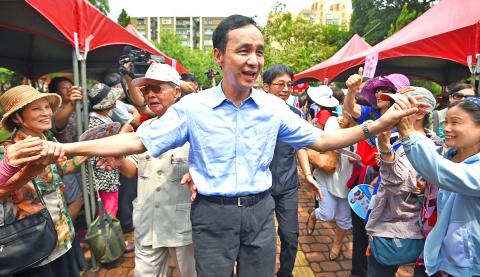Chinese Nationalist Party (KMT) Chairman Eric Chu (朱立倫) yesterday pledged to continue the party’s efforts toward building a nuclear-free nation, a goal that he said is shared by the public.
Noting that work on the Fourth Nuclear Power Plant in New Taipei City’s Gongliao District (貢寮) has been suspended, Chu, who doubles as New Taipei City mayor, said the issue of whether construction should resume must be decided by a referendum.
Chu was addressing remarks made by KMT presidential candidate Hung Hsiu-chu (洪秀柱), who on Sunday said that as 3 million households lost power supplies during Typhoon Soudelor, she would not rule out resuming work on the Fourth Nuclear Power Plant if she is elected.

Photo: Liu Hsin-de, Taipei Times
Typhoon Soudelor caused the loss of power to 4.3 million households across the nation — the worst blackout caused by a typhoon in the nation’s history.
In April last year, President Ma Ying-jeou’s (馬英九) administration decided to immediately halt construction of the nearly completed power plant amid mounting public sentiment against nuclear power.
The government also decided that the question of whether the plant should be put into operation in the future must be determined by a national referendum, which is unlikely to be held until after the next president is inaugurated in May next year.
Hung yesterday said that the fate of the Fourth Nuclear Power Plant would be subject to a legal process.
She said that politicians should tell the people the truth about the energy shortfall facing the nation.
While everyone is willing to support the goal of building a nuclear-free nation, it is very important to determine what methods should be used to achieve that goal, Hung said.
The Democratic Progressive Party (DPP) yesterday criticized Hung over her remarks.
“We hope Hung can be more cautious and professional when speaking about energy issues, as it is obvious that the power outage was due to damage to the power supply system caused by the typhoon,” DPP Spokesperson Cheng Yun-peng (鄭運鵬) said. “It has nothing to do with a power shortage, and we hope Hung understands this.”
Cheng said that the DPP would not change its objective of making Taiwan a nuclear-free nation, and would put more effort into green energy sources and policies aimed at conserving energy.
Additional reporting by Loa Iok-sin

ENDEAVOR MANTA: The ship is programmed to automatically return to its designated home port and would self-destruct if seized by another party The Endeavor Manta, Taiwan’s first military-specification uncrewed surface vehicle (USV) tailor-made to operate in the Taiwan Strait in a bid to bolster the nation’s asymmetric combat capabilities made its first appearance at Kaohsiung’s Singda Harbor yesterday. Taking inspiration from Ukraine’s navy, which is using USVs to force Russia’s Black Sea fleet to take shelter within its own ports, CSBC Taiwan (台灣國際造船) established a research and development unit on USVs last year, CSBC chairman Huang Cheng-hung (黃正弘) said. With the exception of the satellite guidance system and the outboard motors — which were purchased from foreign companies that were not affiliated with Chinese-funded

PERMIT REVOKED: The influencer at a news conference said the National Immigration Agency was infringing on human rights and persecuting Chinese spouses Chinese influencer “Yaya in Taiwan” (亞亞在台灣) yesterday evening voluntarily left Taiwan, despite saying yesterday morning that she had “no intention” of leaving after her residence permit was revoked over her comments on Taiwan being “unified” with China by military force. The Ministry of the Interior yesterday had said that it could forcibly deport the influencer at midnight, but was considering taking a more flexible approach and beginning procedures this morning. The influencer, whose given name is Liu Zhenya (劉振亞), departed on a 8:45pm flight from Taipei International Airport (Songshan airport) to Fuzhou, China. Liu held a news conference at the airport at 7pm,

Taiwan was ranked the fourth-safest country in the world with a score of 82.9, trailing only Andorra, the United Arab Emirates and Qatar in Numbeo’s Safety Index by Country report. Taiwan’s score improved by 0.1 points compared with last year’s mid-year report, which had Taiwan fourth with a score of 82.8. However, both scores were lower than in last year’s first review, when Taiwan scored 83.3, and are a long way from when Taiwan was named the second-safest country in the world in 2021, scoring 84.8. Taiwan ranked higher than Singapore in ninth with a score of 77.4 and Japan in 10th with

GRIDLOCK: The National Fire Agency’s Special Search and Rescue team is on standby to travel to the countries to help out with the rescue effort A powerful earthquake rocked Myanmar and neighboring Thailand yesterday, killing at least three people in Bangkok and burying dozens when a high-rise building under construction collapsed. Footage shared on social media from Myanmar’s second-largest city showed widespread destruction, raising fears that many were trapped under the rubble or killed. The magnitude 7.7 earthquake, with an epicenter near Mandalay in Myanmar, struck at midday and was followed by a strong magnitude 6.4 aftershock. The extent of death, injury and destruction — especially in Myanmar, which is embroiled in a civil war and where information is tightly controlled at the best of times —